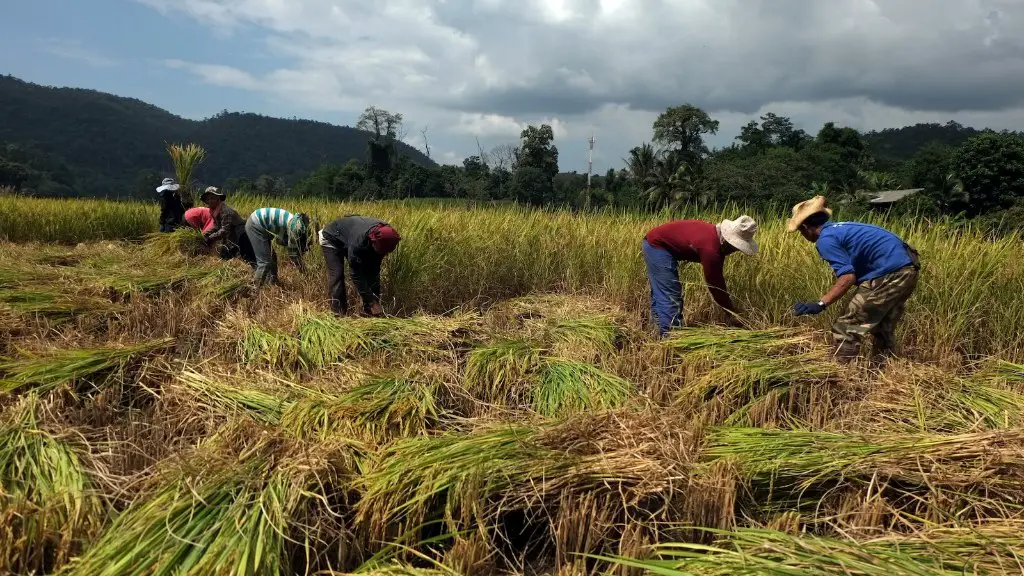Agricultural development in rural areas is essential for the country’s long-term prosperity. To achieve this, we must identify key areas for investment, implement suitable strategies and policies, and provide adequate incentives for farmers to engage in meaningful agricultural activities. Here, we will explore how to develop agriculture in rural areas.
Firstly, it is important to assess the current status of agricultural production in the area in question. This includes conducting research on the types of crops grown, the level of investment and resources available, and the local farming practices. Analyzing this data gives insight into the strengths and weaknesses of the local agricultural system and enables more effective decision-making.
Second, appropriate strategies must be designed and implemented to develop agriculture in the particular area. This might include incentivizing the use of improved crop varieties, or providing better access to quality inputs such as seed, fertilizer, and irrigation systems. It might also encompass the development of agro-tourism and Farmer Field Schools, or even simply ensuring that adequate laws and regulations are in place to protect farmers from exploitation.
Thirdly, it is important to involve the local farmers in the process. Sustainable agriculture relies on the ability of the local farmers to adopt and use the new technologies and practices. Thus, it is important that they are provided with adequate resources and access to necessary training. This will enable them to better understand the process and use the new methods in their farming activities.
Fourthly, it is essential to ensure access to markets. This requires a combination of marketing strategies and public-private sector collaboration. It also necessitates the provision of a safety net for small-scale farmers to guard them against the risks of price fluctuations and market pressures.
Finally, to ensure the success of agricultural development initiatives in rural areas, policymakers must ensure that the policies are educated, equitable and engaging. This means, for example, engaging with local actors and communities, collecting feedback from farmers, and investing in capacity-building programmes. Furthermore, the policies should be framed in such a way as to ensure all stakeholders benefit and no one feels excluded.
Funding for Agricultural Development
Adequate funding for agricultural development is essential for the success of any initiatives. There are a variety of mechanisms through which funding can be secured, such as government and international grants and loans, as well as private sector investments. To ensure the effectiveness of these sources of funding, they must be managed in an efficient and transparent manner, without any adverse impacts on local communities.
Moreover, the funding should be sufficient and tailored to the specific needs of rural areas. For example, a focus on small-scale farmers and women’s access to agricultural resources would be much more effective than allocating funding to large-scale projects, which might have a more limited impact.
Furthermore, adequate resources should be provided to monitor the impact of such initiatives, as well as to track the progress of agricultural development. This will enable the government or other responsible agencies to assess the effectiveness of the different initiatives, as well as their overall impact.
Finally, it is essential to ensure that the resources provided for agricultural development are utilized efficiently. This might include designing competitive procurements to ensure value for money, developing systems to track the use of resources and prevent any corrupt activity, and providing clear guidelines for farmers and other stakeholders.
Incentives for Agricultural Development
It is also important to provide incentives to local farmers to engage in sustainable agricultural activities. These could include subsidies and tax benefits, access to credit and technical help, training, and other support services. Such incentives must be tailored to the specific needs and challenges of each area.
Moreover, the incentives should be provided in a fair and equitable manner and should not exclude certain groups. This includes ensuring that women, who are often excluded from the agricultural sector, have access to the same economic opportunities as men. Furthermore, special attention should be given to local small holder farmers, who often lack the resources to invest in more productive farming techniques.
In addition, the provision of incentives should be accompanied by adequate capacity-building programmes. This is needed so that farmers can better understand the new technologies and adopt them for their own farming systems. This will enable them to increase their yield, diversify their crops, and ultimately benefit from better livelihoods.
Finally, it is also important to ensure that incentives are managed in a transparent and accountable manner. For instance, measures should be taken to ensure that resources are used efficiently and that any corrupt activity is identified and punished.
Role of Government
The government has an important role to play in developing the agricultural sector in rural areas. For one thing, it must ensure the development of an enabling legal and regulatory environment. This includes ensuring that farmers’ rights are respected and protected, as well as providing access to inputs such as land and water.
Moreover, the government should provide adequate human and financial resources for agricultural development initiatives. This could include the provision of financial subsidies, technical assistance, and access to better infrastructure such as roads, irrigation systems and storage facilities.
Furthermore, local farmers should be consulted when developing agricultural policies and strategies. This will ensure that their voices are heard, as well as ensure that policies are grounded in local realities. The government should also invest in research and development to better understand local farming systems and improve the effectiveness of agricultural initiatives.
In addition, investments should also be made in education and training programmes. This includes providing training to local farmers on how to better manage and use their resources, as well as on new technologies and techniques. Such investments are essential to ensure the success of agricultural development in rural areas.
Finally, the government must also ensure that the agricultural sector is monitored and regulated to prevent any instances of exploitation or abuse. This means putting in place laws and regulations to protect farmers and to punish any violations of the law.
Role of Private Sector
The private sector also has an important role to play in developing the agricultural sector in rural areas. This includes the provision of increased access to new technologies, improved access to markets, and better access to finance.
Moreover, the private sector should invest in research and development on agro-ecology, as well as promoting the adoption of improved agricultural practices. This will help to reduce the environmental costs of conventional farming and ultimately lead to more sustainable practices.
Furthermore, the private sector should also invest in capacity-building programmes. This includes providing training to local farmers on how to better use their resources and adopt new technologies, as well as encouraging youth to engage in agricultural activities. This will help ensure a sustainable future for the agricultural sector.
In addition, the private sector can also help to reduce poverty in rural areas by helping to create employment opportunities. For example, it can help to set up processing and packaging plants in rural areas, thereby creating much-needed jobs and increasing access to useful goods and services.
Finally, the private sector should engage with other stakeholders in order to ensure that all voices are heard. This means collaborating with governments, local communities, and NGOs to better understand local needs and develop effective strategies for agricultural development.




